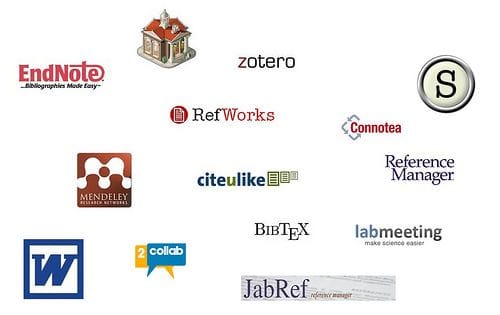Regular readers of this blog know that I often talk about bibliographic management tools (most recently here and here), and it was probably for this reason that I was invited to an interesting full-day workshop last week at the Royal Free Hospital Medical Library in London: Bibliographic Management meets Web 2.0. The event was organized by science librarians Frank Norman, Nathalie Cornee and Betsy Anagnostelis, and was attended by about 20 science librarians. We had demos of the following software:
- EndnoteWeb, demo by Stephanie Marshall
- RefWorks, demo by Aaron Maierhofer
- Connotea, demo by Grace Barnes
- CiteULike, demo by Kevin Emamy
- Zotero, demo by Rintze Zelle
- Mendeley, demo by Victor Henning and Jan Reichelt
This is a fairly complete list of bibliographic software with Web 2.0 features. Missing are some tools with similar features, as there simply wasn't enough time and money to invite them all (e.g. 2collab and Labmeeting), several popular programs without these features (Reference Manager, Citavi and Papers), and JabRef and similar tools for BibTeX files used by LaTeX.
I gave a brief introduction of what features I would look for in a reference manager today (available on slideshare). The six presenters then took up a challenge (Word file here) that was given to them the week before. We used a simplified version of a set of tasks (find reference, put citation into Word document, etc.) originally developed for CiteFest at Northwestern University. Every participant was sitting in front of a computer and follow along with the tasks (the technical staff at the Royal Free did a marvelous job installing the software and bookmarklets on all computers before the workshop). The demos were nicely captured in the FriendFeed room we have set up for the workshop, so you can follow the details of the sessions there (the room also has some excellent links to other resources).
In the discussion at the end we all felt that all reference managers used that day were up to the challenge (Connotea and CiteULike couldn't put references into a Word document, but managed the rest of the tasks perfectly), and we decided not to declare a winner. We also felt that the market is developing so fast, that a feature comparison looked very different 12 months ago (e.g. Mendeley just launched, no Web version of Zotero), and will again look very different 12 months from today. Most librarians in the room therefore felt that they probably have to support most of these tools at their institutions. We briefly talked about the cost of these tools (of the tools that were demoed, only Endnoteweb and Refworks are commercial). This might be an issue when licenses have to be renewed. I've set up a reference manager feature comparison chart a few months ago, and have updated this chart after the workshop.
One feature I really like in Papers is a full-text search of the PDF files in your library, which I think is a much easier way to find information than tagging (and David Crotty agrees with me: Why article tagging doesn't work). I was therefore happy to see that Zotero, Mendeley, CiteULike, and Refworks all support this feature, something I have overlooked before. Full-text search is one more reason that online reference managers should be able to store PDF files. Another reason is that several people working on the same research project shouldn't all have to go out and download the full-text files themselves – or even worse, email them to each other. This sharing is not only an important features of Web 2.0 bibliographic tools, but is obviously also an area of potential problems with copyright (for papers that are not Open Access). CiteULike, Mendeley and Refworks all try to avoid these kinds of issues by allowing sharing of references and PDF files in private groups with a limited number of users.
It was interesting to see that the tools use very different approaches to integrate with the Web. Connotea, CiteUlike and Refworks are Web-based tools (the Refworks Write-N-Cite Windows module can download the reference database for read-only offline use), whereas Zotero, Mendeley and Endnote synchronize between a desktop version and web version. I'm really torn between these two approaches. Web-only reduces the cost of development and maintenance (no need to develop separate versions for Web/Windows/Mac/Linux, users don't have to install new versions). Desktop/Web allows offline use users always have a copy of their data on their computer. There is probably no right answer to this, email is another example where both approaches are very successful.
Only after the meeting did I realize another interesting difference between the various tools. They all have different business models behind them: Endnoteweb: (mostly) single-user licenses, Refworks: site licenses, Connotea: owned by a publisher, CiteUlike: independent with support from a publisher, Zotero: Open Source and Mendeley: Web 2.0 company that plans free and paid services. This might actually be a deciding factor in determining which of these tools will be the most successful in the long-term future.
But in the end, the similarities far outweigh the differences between these tools. We didn't have time left to talk more about this, but for Bibliographic Management to move to Web 2.0, it's not really just about technology, but rather mostly about the users. We had an interesting discussion about that topic a few weeks ago (How to close the digital divide among scientists). I believe that ultimately your collection of references should sit in a database that is accessible from the web. Some references you want to share with everybody (e.g. via tools like FriendFeed), and that includes your own publications. And some references you want to share with private groups of people, e.g. people in your lab or when coauthoring a paper. All the tools presented in the workshop allow you to do that.


